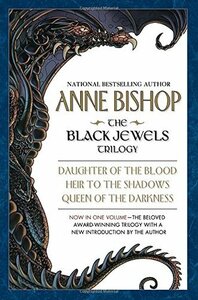Take a photo of a barcode or cover
149 reviews for:
The Black Jewels Trilogy: Daughter of the Blood, Heir to the Shadows, Queen of the Darkness
Anne Bishop
149 reviews for:
The Black Jewels Trilogy: Daughter of the Blood, Heir to the Shadows, Queen of the Darkness
Anne Bishop
Dark adult fantasy about feminine power set in a declining matriarichal society. Some big ideas--the universe is upside-down: darkness is good, the High Lord of Hell is a sympathetic protagonist--but don't be frightened off. The tale is spun so well and characters are so compelling that this trilogy is un-put-downable.
One of the best fantasy novels that I have read in a very long time. It was easy to read, but the plot line was in-depth enough to make it mind provoking. It had a very sexual air to the trilogy, without a doubt, but it did not seem unecessary. In fact, it was very well encooperated and gave a feeling of belonging--as if that way of life was actually, not so much reasonable, as it is realistic. It is kept in check quite well to avoid it from becoming a smut series, which delighted me quite enthusiastically. The characters were also well developed, and the place of "Hell" was given a whole new objective approach. Characters had names such as Saetan, Lucivar, and Damien. However, they were not bad characters and Hell was not a bad place. This series seems to take our..."opinion" of what is right and wrong, and gives it an all new perspective. It demonstrates not the evil in immortal beings, but the cruelty in Human beings. A fantastic novel that will be staying on my shelf for many years to come.
Hard to get into at the start, with all the terminology and names thrown at you, but the story is really well plotted, the characters interesting and sympathetic and the issues of trust and love are dealt with in a refreshingly realistic way. Magic was okay- I would preferred to have seen more unique things done with the jewels, and the webs stuff had a lot more potential than was explored in the books.
But really the reason I love the books is the world is fascinating and fully realized. It's study of a matriarchal society that has its own rules and sexism issues. And the characters are so complex, and the hurts and the healing are more realistic than most I've read elsewhere.
Plus the plot over the three books is so tight that they read very smoothly like one really long book. Clearly well edited and thoughtfully plotted out (not slapdash or "I am making things up as I go along").
But really the reason I love the books is the world is fascinating and fully realized. It's study of a matriarchal society that has its own rules and sexism issues. And the characters are so complex, and the hurts and the healing are more realistic than most I've read elsewhere.
Plus the plot over the three books is so tight that they read very smoothly like one really long book. Clearly well edited and thoughtfully plotted out (not slapdash or "I am making things up as I go along").
Anne Bishop never fails to write a story that grabs me right way and does not let me go until the very last page. The Black Jewels series is definitely my favorite of all her books. All of the books set in this world have intriguing story lines and characters who fascinate me. Even the characters I loathe are still well written. Any book by Anne Bishop is a must read and this series is no exception.
Both Jaenelle and Daemon both have to fight their way from madness to sanity and to fight for their rights to be alive and well in a society that seems determined to undermine them.
Still have some issues but overall I thought it was a stronger book than Daughter of Blood.
Still have some issues but overall I thought it was a stronger book than Daughter of Blood.
This is a gorgeously lush, dark series, and one of my absolute favourites. It's a series that I actually enjoy rereading, and to be honest, with so many books out there it's rare that I do that.
The Black Jewels takes you into a world where everyone is divided into castes according to the jewels they wear (and the powers that come along with them). The gender roles are also flipped on their end, but that by no means that things are perfect... Not at all.
Instead Terreille is buckling under the pressure of a corrupt aristocracy, and Anne Bishop takes us into the lives of those most affected and damaged by it. At the centre all of this is Jaenelle, who we initially meet as a heart-achingly vulnerable little girl, but who grows into a powerful force to be reckoned with. There's magic and corruption and incredible power, and characters who will fascinate and disgust you and break your heart and make you love them.
The world is fascinating and well written, the world building completely sucked me in and these books have been among my favourites for a few years, now. Definitely worth checking out!
The Black Jewels takes you into a world where everyone is divided into castes according to the jewels they wear (and the powers that come along with them). The gender roles are also flipped on their end, but that by no means that things are perfect... Not at all.
Instead Terreille is buckling under the pressure of a corrupt aristocracy, and Anne Bishop takes us into the lives of those most affected and damaged by it. At the centre all of this is Jaenelle, who we initially meet as a heart-achingly vulnerable little girl, but who grows into a powerful force to be reckoned with. There's magic and corruption and incredible power, and characters who will fascinate and disgust you and break your heart and make you love them.
The world is fascinating and well written, the world building completely sucked me in and these books have been among my favourites for a few years, now. Definitely worth checking out!
While it took me forever and a day to finally get around to reading this book, I came away with the feeling that it was definitely better than Daughter of the Blood in many ways, that characters got greater development and many of my initial issues with the first book were resolved satisfactorily. My greater enjoyment of it over the first book was, I admit, rather subjective, since while I did rate the first book decently, I also had many negative memories attached to it that coloured the experience, and since this was the first time I’d moved further in the trilogy’s plot, I had no such experiences to colour this one.
Heir to the Shadows continues Jaenelle’s story, focusing on her teenage years and her struggles with post-rape amnesia and the eventual return of those memories, along with the fact that she holds an insane amount of power that she must also learn to master. Placed under Saetan’s care to keep her from the family that allowed years of abuse to happen, she teeters back and forth between being a relatively normal child (as normal as one can be when they’re being raised by the Lord of Hell, anyway), and being the living embodiment of the power that the Blood hold. Meanwhile, the corruption in Terreille is making its way to Kaeleer, threatening them all.
It’s interesting how Bishop essentially makes a large chunk of a fantasy novel about sexual politics and recovery from sexual trauma, and not only that, but she does it well. Much of the early sections of book that centre on Jaenelle and those around her are very focused on how to handle someone who has undergone a serious trauma but has blocked the memories, knowing that those memories will have the be faced eventually but all of them wanting to keep her from harm for as long as they can. There was a section that particularly impressed me, as it’s something that’s still as relevent today (and often spoken of today) as it was when the book was written.
Then she seemed to shrink into herself. “But, Lucivar,” she said weakly, “what if it’s my fault that he’s aroused and needs relief?”
And:
“You have to service me!” Roxie shouted, pushing herself into a sitting position. “You got me aroused. You have to service me.”
How many times have we heard lines like that appear in recent media and news?
But even aside from the sexual politics and commentary that run throughout the novel, the rest of the actual story is also something that’s well worth reading. Lucivar gets far more page time and development than in Daughter of the Blood, which was nice to see because previously he was someone who showed up for a few scenes and was supposed to be important but didn’t actually play much of a part. Daemon was largely absent, contrary to his very large role in the first books; it’s like he and Lucivar got switched when it came to who to shine the spotlight on. We also get a chance to see the character list expand, with Jaenelle’s friends, and this affords readers the chance to see what a good Queen ought to be, rather than just the looks at corrupted Queens from the first novel.
Heir to the Shadows does a lot of that, really. Comparisons to earlier material, and expansion upon what was previously established. Much occurred in the first book that I felt wasn’t really explained well, or seemed very random and coming out of nowhere. Here, time is devoted to explaining that in greater depth, and not just in pages of exposition for the reader’s benefit or in conversations that characters probably wouldn’t actually have. You can see the evolution of Bishop’s writing already, just between one books and the next. It also gave me a much better appreciation for her ability to world-build; even if it wasn’t explained or presented in the best way early on, all the information about the very complex world and its various cultures was there in her head from the beginning, and realising that gave me a huge amount of respect for her.
Heir to the Shadows turned my opinion of this series from “okay but I may or may not continue with it” to “I really want to finish this trilogy and read the other side novels and short stories.” Aside from occasionally irritating repetition in the text (but hey, everything has its price), the writing has improved noticeably between the first book and the second, the characters have had ample room to grow and develop, and the book’s story ends in such a way that left me wishing I had a copy of the third and final book in the trilogy on my shelves right there and then. It may have been written 15 years ago, but the writing ages well, the issues relative to the real world still stand today as they did then, and it’s an intriguing set of dark fantasy concepts that Bishop plays with here. Very much looking forward to finishing the trilogy now, and I have high hopes for it!
Heir to the Shadows continues Jaenelle’s story, focusing on her teenage years and her struggles with post-rape amnesia and the eventual return of those memories, along with the fact that she holds an insane amount of power that she must also learn to master. Placed under Saetan’s care to keep her from the family that allowed years of abuse to happen, she teeters back and forth between being a relatively normal child (as normal as one can be when they’re being raised by the Lord of Hell, anyway), and being the living embodiment of the power that the Blood hold. Meanwhile, the corruption in Terreille is making its way to Kaeleer, threatening them all.
It’s interesting how Bishop essentially makes a large chunk of a fantasy novel about sexual politics and recovery from sexual trauma, and not only that, but she does it well. Much of the early sections of book that centre on Jaenelle and those around her are very focused on how to handle someone who has undergone a serious trauma but has blocked the memories, knowing that those memories will have the be faced eventually but all of them wanting to keep her from harm for as long as they can. There was a section that particularly impressed me, as it’s something that’s still as relevent today (and often spoken of today) as it was when the book was written.
Then she seemed to shrink into herself. “But, Lucivar,” she said weakly, “what if it’s my fault that he’s aroused and needs relief?”
And:
“You have to service me!” Roxie shouted, pushing herself into a sitting position. “You got me aroused. You have to service me.”
How many times have we heard lines like that appear in recent media and news?
But even aside from the sexual politics and commentary that run throughout the novel, the rest of the actual story is also something that’s well worth reading. Lucivar gets far more page time and development than in Daughter of the Blood, which was nice to see because previously he was someone who showed up for a few scenes and was supposed to be important but didn’t actually play much of a part. Daemon was largely absent, contrary to his very large role in the first books; it’s like he and Lucivar got switched when it came to who to shine the spotlight on. We also get a chance to see the character list expand, with Jaenelle’s friends, and this affords readers the chance to see what a good Queen ought to be, rather than just the looks at corrupted Queens from the first novel.
Heir to the Shadows does a lot of that, really. Comparisons to earlier material, and expansion upon what was previously established. Much occurred in the first book that I felt wasn’t really explained well, or seemed very random and coming out of nowhere. Here, time is devoted to explaining that in greater depth, and not just in pages of exposition for the reader’s benefit or in conversations that characters probably wouldn’t actually have. You can see the evolution of Bishop’s writing already, just between one books and the next. It also gave me a much better appreciation for her ability to world-build; even if it wasn’t explained or presented in the best way early on, all the information about the very complex world and its various cultures was there in her head from the beginning, and realising that gave me a huge amount of respect for her.
Heir to the Shadows turned my opinion of this series from “okay but I may or may not continue with it” to “I really want to finish this trilogy and read the other side novels and short stories.” Aside from occasionally irritating repetition in the text (but hey, everything has its price), the writing has improved noticeably between the first book and the second, the characters have had ample room to grow and develop, and the book’s story ends in such a way that left me wishing I had a copy of the third and final book in the trilogy on my shelves right there and then. It may have been written 15 years ago, but the writing ages well, the issues relative to the real world still stand today as they did then, and it’s an intriguing set of dark fantasy concepts that Bishop plays with here. Very much looking forward to finishing the trilogy now, and I have high hopes for it!




